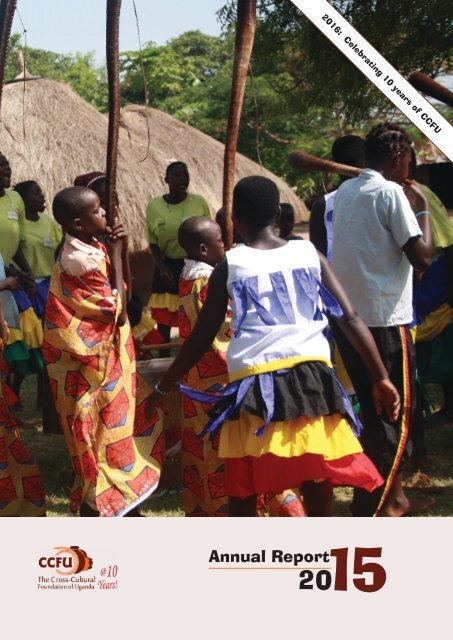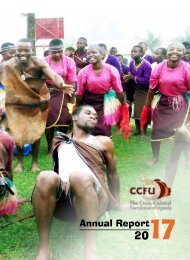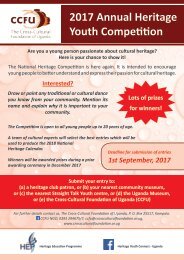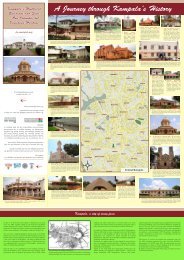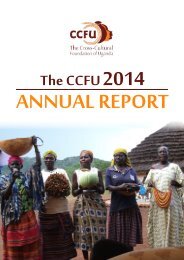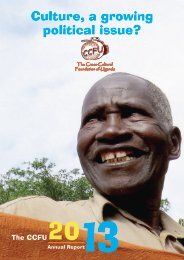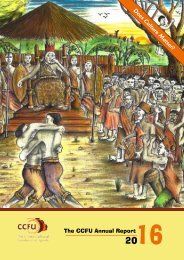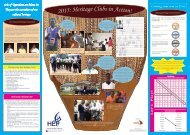CCFU Annual Report 2015
Create successful ePaper yourself
Turn your PDF publications into a flip-book with our unique Google optimized e-Paper software.
<strong>Annual</strong> <strong>Report</strong><br />
2016: Celebrating 10 years of <strong>CCFU</strong>
Heritage club members at Mother Thereza Primary School, Adjumani dancing the Muree, a traditional Madi dance<br />
Inside…<br />
A word from the Board 2<br />
The year in review: Culture - a seldom explored source of wealth 3<br />
Programme highlights 7<br />
<strong>CCFU</strong> expands its team 14<br />
<strong>CCFU</strong> marks 10 years in 2016 15<br />
Prospects for 2016 17<br />
A word of thanks 18<br />
21<br />
Illustrations by Sebandeke Muhammed from the <strong>CCFU</strong> publication “Speaking Out” (see p.9)
A word from<br />
the Board<br />
On behalf of the Board of Directors of <strong>CCFU</strong>,<br />
I would like to welcome you to yet another<br />
annual report. Allow me to congratulate all<br />
the stakeholders, partners, donors and staff of<br />
the organisation for the achievements made<br />
during the year. Thank you for your moral,<br />
fi nancial and physical support.<br />
I became a member of <strong>CCFU</strong>’s Board in <strong>2015</strong>,<br />
although my association with the Foundation<br />
dates back to 2007 when I joined the National<br />
Commission for UNESCO and started relating<br />
with different stakeholders relating to UNESCO’s<br />
work. I found the Executive Director Ms. Emily<br />
Drani, a very passionate person on matters of<br />
culture.<br />
Working with <strong>CCFU</strong> as a Treasurer has given<br />
me a good opportunity to understand the<br />
Foundation’s programmes and priority areas.<br />
During one of the planning meetings I attended<br />
where the staff and board members came<br />
together to re-strategise for the organisation, I<br />
was impressed by the team spirit and appreciated<br />
the new ideas, including developing a heritage<br />
programme for tertiary education institutions<br />
and better responding to the challenging policy<br />
environment..<br />
Finding fi nancial support for the Foundation’s<br />
activities remains a challenge and, as board<br />
member, I shall continue to market <strong>CCFU</strong>.<br />
I wish you good reading as you explore <strong>CCFU</strong>’s<br />
activities during <strong>2015</strong> and hope for greater<br />
achievements in 2016.<br />
Rosie Agoi,<br />
Deputy Secretary-General<br />
Uganda National Commission for<br />
UNESCO<br />
12
The year in review<br />
Culture: a seldom<br />
explored source<br />
of wealth<br />
2
Culture: a seldom explored source of wealth<br />
A desire to put as much distance as possible away from poverty has led Ugandans down many<br />
roads (both legitimate and illegitimate) in the pursuit of wealth. The nearest and most familiar<br />
of these roads, by the name of culture, is only now being fully explored. In this year’s review,<br />
we look at how different stakeholders have invested in and used cultural resources to create<br />
material wealth, and the opportunities that exist for continuing to do so.<br />
Initiating development programmes<br />
<strong>2015</strong> saw several cultural institutions put up a<br />
spirited fi ght against poverty. Cultural leaders<br />
from Lango, Bunyoro, Buganda, Busoga, and<br />
Tooro called upon all cultural institutions to<br />
focus on development concerns, noting that their<br />
relevance lies in serving the social and economic<br />
interests of their people. There were campaigns<br />
to increase food production on a commercial<br />
scale (Bunyoro, Buganda); to promote indigenous<br />
crops and tree planting (Bunyoro, Padhola,<br />
Buganda); to raise livestock and to establish clan<br />
leaders’ cooperatives (Buruuli) and to restore<br />
tea growing (Alur). Cultural institutions reported<br />
investments in health, agricultural, educational<br />
and social protection projects; scholarships;<br />
commercial infrastructure; the construction of<br />
offices and training centres, and the restoration<br />
of palaces and cultural sites.<br />
plans, some borrowing ideas from Buganda’s<br />
ettoffaali drive.<br />
Land is an essential cultural and economic<br />
resource. In <strong>2015</strong>, the Buganda Kingdom<br />
continued to reclaim land titles confiscated by<br />
previous governments. Cultural institutions<br />
across the country also demanded the return of<br />
their property as a potential source of wealth<br />
creation. The leaders of the Banyoro, Alur, Acholi,<br />
Lugbara and Batooro communities asked for a<br />
share of the proceeds from natural resource<br />
extraction and exploration in their areas to<br />
fi nance community development. Lack of clarity<br />
on matters of land and property ownership has<br />
however led to conflicts both within and between<br />
cultural institutions, and with government<br />
agencies in different locations.<br />
In an effort to generate wealth, some cultural<br />
institutions have entered into partnership with<br />
foreign investors, such as the Buganda-China<br />
initiative to build housing units; the Kooki-<br />
Arabian and Japanese partnership for agriculture<br />
and education projects; and the Busoga-Danish<br />
farmers’ engagement for agricultural promotion.<br />
Partnerships with the State have also resulted<br />
in the promotion of cultural tourism, direct<br />
funding and technical support to restore cultural<br />
sites, palaces and other heritage properties.<br />
Sources of fi nance proved equally diverse.<br />
Cultural institutions with viable assets generated<br />
revenue from processing the registration of land<br />
titles, and from businesses operations on their<br />
land, such as markets. They benefi ted from forest<br />
reserves, tourism and cultural sites, as well as from<br />
royalties and the sale of certifi cates, calendars<br />
and portraits. Several cultural institutions also<br />
initiated fundraising drives to implement their<br />
34
The Busoga Kingdom initiated a development<br />
organisation - Busoga Yaiffe – and encouraged the<br />
Basoga in the diaspora to invest and contribute to<br />
local development. Partnerships with NGOs also<br />
took root, such as <strong>CCFU</strong> with the Alur kingdom,<br />
which resulted in fi rm measures to preserve the<br />
shea nut trees for their cultural and economic<br />
value; while the Participatory Ecological Land<br />
Use Management Uganda promoted indigenous<br />
foods for food security and sustainable livelihoods<br />
through technical and material support.<br />
Cultural leaders called upon the youth to be<br />
creative and to utilise their knowledge and<br />
available resources to generate income. Hard<br />
work, saving and embracing a reading culture<br />
were underlined as essential to break the cycle<br />
of poverty. In <strong>2015</strong>, the Nabagereka’s Uganda and<br />
UK Ekisaakaate programmes provided notable<br />
the Sabiny Culture and Tourism Festival, the Kigezi<br />
Cultural Festival, the Buganda Tourism Expo, and<br />
similar initiatives in Bunyoro and Busoga add<br />
to the list of these events. The Ndere Cultural<br />
Centre, the House of Entertainment and others<br />
continued to showcase the diversity of Uganda’s<br />
cultural expressions and to earn a living from<br />
this work, while the Uganda Community Tourism<br />
Association provided technical and material<br />
support to women to produce, showcase and<br />
sell Ugandan crafts on a commercial basis.<br />
The coronations and associated anniversaries of<br />
cultural leaders often attract large crowds and<br />
sources of cultural knowledge. Sr Dr Dominic<br />
Dipio, Dr Mercy Mirembe and Dr Aaron<br />
Mushengyezi, among other contributors to the<br />
production of fi lm, drama and literature, provided<br />
a valuable foundation for cultural creativity and<br />
innovation.<br />
Cultural tourism<br />
A growing number of cultural events provided<br />
opportunities for visual and performing artists<br />
to gain exposure and generate income in <strong>2015</strong>.<br />
These included the Uganda, the Pearl art exhibition,<br />
Jamafest in Nairobi, and the Indaba Tourism Expo<br />
in South Africa (where Uganda won the accolade<br />
for best stand). The Pearl of Africa Tourism Expo,<br />
offer plenty of business opportunities. In <strong>2015</strong>,<br />
we celebrated anniversaries for the Kabaka<br />
of Buganda, the Omukama of Bunyoro, the<br />
Ssabaruuli, the Obwakamuswaga of Kooki and<br />
several others. The coronation of the cultural<br />
leaders of the Basoga, Bagwere, Bamasaba,<br />
Basongora and Bagisu were not only cause for<br />
celebration, but also created opportunities for<br />
forging and deepening partnerships between and<br />
beyond institutions, for generating income and<br />
for launching development projects.<br />
Places of historical and cultural signifi cance are<br />
important sources of identity, with the potential<br />
to promote cultural tourism, employment and<br />
income. A map of 52 sites of historical and<br />
cultural importance in Kampala was launched by<br />
<strong>CCFU</strong> and the Kampala City Council Authority<br />
announced its plan for a city tourism bus,<br />
both of which are likely to create employment<br />
opportunities and generate income for property<br />
5
owners and tour operators. Improved and<br />
newly-established heritage tourism sites and<br />
museums (such as the Uganda Martyrs Museum<br />
in Namugongo – recently visited by His Holiness<br />
Pope Francis - the Ker Kwonga Chiefdom<br />
Museum in Nebbi) and the Igongo Cultural<br />
Centre near Mbarara also provide avenues<br />
for employment and revenue generation. The<br />
cultural and historical heritage as a viable source<br />
of wealth.<br />
It takes wealth to create wealth - in the form<br />
of fi nances, viable land, properties, businesses,<br />
knowledge and partnerships – but wealth<br />
creation can only be effectively sustained if<br />
it is accompanied by integrity and effi cient<br />
accountability, manifested in the responsible<br />
use of resources, funds and authority. In <strong>2015</strong>,<br />
officials from cultural institutions (Bunyoro,<br />
Tooro, Alur and Acholi) were probed over abuse<br />
of authority and in some cases misuse of funds.<br />
This underlines the need to establish and enforce<br />
clear procedures and accountability mechanisms<br />
to ensure that leaders remain the trusted<br />
custodians of our cultural heritage.<br />
Nevertheless, <strong>2015</strong> saw new energy associated<br />
adoption of a Museums and Monuments policy<br />
<strong>2015</strong> offers a welcome framework within which<br />
this sub-sector may be further improved.<br />
Other wealth-creating<br />
opportunities<br />
Besides the initiatives mentioned above, Uganda<br />
this year became the 139 th country to ratify the<br />
2005 UNESCO Convention on the Protection and<br />
Promotion of Diversity of Cultural Expressions.<br />
This opens opportunities for fi nancial and<br />
technical support and to strengthen Uganda’s<br />
cultural industry, access global trade and forge<br />
international partnerships. Uganda had earlier<br />
ratifi ed the 2003 UNESCO Convention on<br />
Safeguarding of the Intangible Cultural Heritage<br />
which also offers technical and fi nancial support in<br />
this regard. The Government of Uganda allocated<br />
U.shs 30 billion to the Uganda Tourism Board to<br />
market Uganda and initiated ‘Operation Wealth<br />
Creation’ which provide immense opportunities<br />
to explore and develop different aspects of our<br />
with culture and the many ways in which it can<br />
lead to wealth. Cultural institutions and citizens at<br />
large are exploring and developing an increasing<br />
range of initiatives that our cultural diversity and<br />
values offer in this respect.<br />
<strong>CCFU</strong> was pleased to be associated with some<br />
of these endeavours: the next pages outline the<br />
Foundation’s main activities in <strong>2015</strong>.<br />
56
6<br />
Programme<br />
Highlights
In the course of the year, our activities were diverse, ranging from work with cultural<br />
institutions, with indigenous groups pressing for their cultural rights, with youth and their<br />
heritage clubs, and with Kampala Capital City Authority and others to protect our built<br />
heritage. Here are some highlights:<br />
1. Culture in Governance – cultural leaders at work<br />
Uganda’s law currently defines cultural institutions<br />
as “cultural” entities, barred from engaging in<br />
partisan political activities. Yet our cultural leaders,<br />
by virtue of their infl uence and legitimacy, engage<br />
in work that shapes the communities that identify<br />
with them. Their infl uence over decision-making<br />
and the distribution of resources inevitably<br />
makes their work appear as “political”. When<br />
addressing issues of culture and governance,<br />
<strong>CCFU</strong> therefore sees cultural leaders as essential<br />
partners.<br />
This year <strong>CCFU</strong> worked with the leaders of<br />
16 cultural institutions and with the secretariat<br />
of the Kings’ and Cultural Leaders’ Forum to<br />
develop a statement which articulates their<br />
aspirations and expectations for the next 5<br />
years. The statement, which forms part of the<br />
Citizens’ Manifesto process, was launched by<br />
a representative of the Ministry for Gender,<br />
Labour and Social Development who delivered<br />
the Minister’s speech. Cultural leaders have<br />
begun to consult and to develop detailed plans<br />
for the establishment of a National Cultural<br />
Leaders’ Assembly, one of the key resolutions<br />
made in their Statement.<br />
We hereby commit our cultural institutions to promote<br />
our cultural values and customs for the benefit of society<br />
[…and] encourage all cultural institutions to develop and<br />
operationalise Constitutions and Codes of Conduct […] , to<br />
take reasonable steps to include women in senior leadership<br />
positions […] and to work together to establish a National<br />
Cultural Institutions’ Assembly.<br />
More than 80 cultural leaders meet in Nebbi to discuss governance issues; the launch of the Cultural<br />
Institutions’ Statement in Kampala<br />
8
2. Indigenous Minority Groups and their cultural rights – a<br />
call for action<br />
The cultural rights of Uganda’s indigenous<br />
minority groups are rarely observed and their<br />
cultural identity is often at risk of being eroded by<br />
their more dominant and numerous neighbours.<br />
Languages are disappearing, discrimination and<br />
stereotypes setting in, cultural practices dying<br />
out and cultural assets often stand inaccessible in<br />
National Parks and other protected areas, while<br />
political power for such small groups remains<br />
elusive.<br />
In <strong>2015</strong>, <strong>CCFU</strong> worked with 21 indigenous<br />
minority groups from across the country to<br />
develop a national statement on “The Cultural<br />
Rights of Indigenous Minorities in Uganda – A<br />
Call for Action” to draw the attention of policy<br />
makers to the importance of respecting the<br />
cultural rights of Uganda’s indigenous minorities.<br />
Access to one’s cultural resources is one of<br />
these rights: <strong>CCFU</strong> was happy to witness this<br />
year the inauguration of the Ik House of Memory,<br />
one of the community museums associated with<br />
indigenous minorities.<br />
<strong>CCFU</strong> had earlier invited all indigenous minority<br />
groups to participate in a language competition,<br />
aimed at preserving minority languages,<br />
developing their literature, promoting national<br />
pride and identity, and raising awareness of their<br />
cultural rights. The resulting book “Speaking<br />
Out!” with creative writing from authors from<br />
13 different minority groups, was published by<br />
Fountain and launched on World Culture Day in<br />
Kampala by Hon. Rukia Nakadama, State Minister<br />
for Gender and Culture.<br />
Since the launching of the Ik House of Memory, the<br />
community has picked interest in the preservation and<br />
promotion of culture. We hope that soon it will become<br />
a study centre, especially for the primary school which<br />
is near the museum and probably the secondary schools<br />
will come in<br />
– Lomeri John Mark, Coordinator, Ik<br />
Agenda Development Initiative (centre)<br />
Representatives of indigenous minority groups<br />
work on a National Policy Brief advocating for<br />
their cultural rights; the Ik House of Memory is<br />
inaugurated; “Speaking Out!” is launched by the<br />
Hon. Minister of State for Culture<br />
9
3. The Heritage Education Clubs - a growing movement<br />
It is now 5 years since <strong>CCFU</strong> started engaging<br />
young people to promote Uganda’s cultural<br />
heritage. This initiative stemmed from a belief<br />
that young Ugandans – representing more than<br />
60% of the national population – must not only<br />
cherish their culture if it is to survive, but they<br />
must also assume a responsibility to pass it on to<br />
the next generations.<br />
Much of our work has centred on Heritage<br />
Education Clubs in 80 secondary schools<br />
throughout the country, supported by<br />
community museums and cultural coordinators<br />
in their vicinity. Clubs have been encouraged to<br />
implement a variety of activities to help young<br />
people re-connect with their cultural heritage,<br />
including participation in the annual National<br />
Heritage Competition for Youth. A fi lm was<br />
produced to illustrate their achievements and<br />
to encourage other youth to join this growing<br />
movement.<br />
In conjunction with our activities in schools,<br />
<strong>CCFU</strong> was particularly pleased to work with the<br />
National Curriculum Development Centre and<br />
to see cultural issues incorporated in the new<br />
curriculum for secondary schools, with “sample<br />
extracts” successfully tested in 11 of them.<br />
I work at the Bugungu Heritage and Information Centre.<br />
With funding from <strong>CCFU</strong>, we promoted traditional music and<br />
knowledge on culture in schools, through a mobile museum.<br />
This has helped young people rediscover who they are as<br />
Bagungu – Wilson Kiiza<br />
Kashari SS Heritage Club visits the Igongo Cultural Museum; craft-making at the Nakigo SS Heritage Club; launching<br />
the 2016 Heritage Calendar; teachers after the review of cultural aspects in the new curriculum at the National<br />
Curriculum Development Centre<br />
910
4. Protecting Historical Buildings – an urgent undertaking<br />
Historical buildings and sites form an important<br />
part of our cultural heritage. Whether it is<br />
Kasubi Tombs, the Madhvani Building on Jinja’s<br />
main street, the Kabaka’s Lake or the Bahai<br />
Temple in Kampala, these and many others are<br />
treasured because of the stories they tell us and<br />
the important cultural traditions and values they<br />
are associated with.<br />
Yet everywhere, this heritage is at grave risk<br />
of disappearing, as the incessant drive for<br />
“modernity” sweeps older structures before it,<br />
often to be replaced by soulless and inappropriate<br />
glass and concrete edifices.<br />
In <strong>2015</strong>, <strong>CCFU</strong> embarked on an initiative to<br />
preserve the built heritage at risk in Kampala,<br />
starting with the development and launch of an<br />
annotated map of Kampala’s Historical Buildings<br />
and Sites – Our Valuable but Vanishing Heritage.<br />
This was produced in partnership with the<br />
Uganda Museum, the Uganda Tourism Board,<br />
Kampala Capital City Authority (KCCA) and the<br />
Buganda Heritage and Tourism Board.<br />
<strong>CCFU</strong> and its partners on this project hope that<br />
the map - as a fi rst step in this preservation drive<br />
- will bring the selected 51 buildings and sites<br />
to the attention of Ugandans and visitors on the<br />
urgent need to protect our national heritage.<br />
Historical buildings are part of our culture as Ugandans. They<br />
tell our story but there is no real effort to preserve them […]<br />
We need to strengthen our laws; to increase awareness and to<br />
put more efforts in this so that as you walk into a building or<br />
down a street, you will be able to identify parts of our history<br />
– Jennifer Musisi, Executive Director, KCCA.<br />
The map of historical buildings in Kampala is launched by the Chairperson of the Uganda Tourism Board, James Tumusiime,<br />
in the presence of Jennifer Musisi, the Executive Director of KCCA; the Uganda Bookshop, one of the few remaining historical<br />
buildings in central Kampala<br />
11
5. Other activities<br />
Linking and learning internationally<br />
<strong>CCFU</strong> continued to benefi t from its international<br />
linkages throughout <strong>2015</strong>. The International<br />
National Trusts Organisation – INTO – held<br />
its conference in Cambridge, England (already<br />
2 years since the 2013 Entebbe Conference!)<br />
This event provided an opportunity to learn<br />
from the largest Trust (National Trust of England,<br />
Wales and Northern Ireland) in the family and to<br />
share our experiences on the Kampala Historical<br />
Buildings project. The INTO General Assembly<br />
elected <strong>CCFU</strong> as vice-chair of the organisation.<br />
The INTO conference in Cambridge<br />
The Foundation also continued to work with<br />
UNESCO in the framework of the 2003<br />
International Convention for the Safeguarding<br />
the Intangible Cultural Heritage: we attended<br />
the 10th Inter-Governmental Meeting held in<br />
Namibia as an accredited NGO and made a<br />
presentation to selected delegates on our work<br />
to support empaako - the naming practice,<br />
one of the elements of intangible heritage<br />
inscribed under the Convention. <strong>CCFU</strong> also<br />
participated in a 1-week UNESCO experts’<br />
workshop on supporting policy development<br />
in the fi eld of intangible cultural heritage which<br />
took place in Algeria. The workshop targeted<br />
UNESCO-certifi ed facilitators from the Africa<br />
Region.<br />
We also had the opportunity to complete a new<br />
edition of the Culture in Development manual,<br />
supported by Plan International; this edition now<br />
refl ects experiences drawn from Uganda, Kenya<br />
and Zimbabwe.<br />
Culture and conservation<br />
<strong>CCFU</strong> was commissioned by the<br />
Arcus Foundation to develop a<br />
paper on “Dealing with diverse<br />
perceptions of conservation and<br />
culture in Uganda” to be published<br />
in 2016. The paper highlights the<br />
need to recognise the existence<br />
in Uganda of often parallel, but<br />
different bodies of knowledge that<br />
inform conservation efforts.<br />
On the one hand, traditional<br />
perspectives, worldviews and needs,<br />
which in turn determine how most<br />
people relate and care for their environment<br />
and, on the other, the body of researched<br />
Western-inspired knowledge on conservation.<br />
The paper argues that seeking convergence with<br />
diverse bodies of knowledge and supporting<br />
culturally-informed processes that resonate with<br />
conservation needs may provide lasting solutions<br />
to conservation challenges in the country.<br />
In <strong>2015</strong>, the Foundation supported two<br />
cultural institutions to address environmental<br />
conservation issues in the oil producing and<br />
prospecting regions: the Aryek Chiefdom in Alur<br />
continued working on its project (the fi rst of<br />
its kind in West Nile) to promote shea butter<br />
tree planting, both as an environmental activity<br />
and as a way to encourage cultural values and<br />
practices associated with this tree. In Bunyoro,<br />
the Kingdom and <strong>CCFU</strong> supported private forest<br />
owners, women’s groups and primary schools<br />
to stimulate indigenous tree planting associated<br />
with the empaako naming ceremony.<br />
12
The Aryek Chiefdom project to preserve and promote the growth of<br />
shea butter nut trees has made a big impact in the lives of the local<br />
people. Before this project, there used to be a lot of cutting of these<br />
trees for timber and charcoal burning. Our people now are planting the<br />
tree in their compounds and farms – Moses Okwonga, Minister,<br />
Alur Kingdom.<br />
Supporting heritage conservation and promotion work in districts<br />
In <strong>2015</strong>, <strong>CCFU</strong> concluded the fi rst phase of its<br />
support to selected districts (Kibaale, Rakai and<br />
the Madi sub-region), where heritage development<br />
plans were implemented. Activities included 2<br />
small museums, promotion of traditional music<br />
and literature (such as a publication of poems,<br />
songs and proverbs for schools in the Madi subregion),<br />
historical sites preservation and publicity.<br />
In tandem with this, <strong>CCFU</strong> published an<br />
illustrated guide on Designing and Implementing<br />
Heritage Development Plans in Districts and<br />
Communities.<br />
<strong>CCFU</strong>’s district guide; at the Madi Community Museum and at the Kooki Cultural Museum; the publication on<br />
Madi stories and proverbs for youth<br />
13
<strong>CCFU</strong> expands its team – welcome to<br />
our young professionals<br />
In <strong>2015</strong>, the Foundation was privileged to host<br />
three interns - or Young Professionals - identifi ed<br />
and supported by Restless Development, a youthfocused<br />
NGO. This was both in an attempt to fulfi l<br />
our social responsibility to provide opportunities<br />
for professional growth to young Ugandans and<br />
as a way to plug some of our human resource<br />
gaps.<br />
After 6 months at <strong>CCFU</strong>, the experience proved<br />
benefi cial on several fronts. Whether bringing<br />
fresh ideas and initiatives, keenly helping to<br />
fulfi l tasks when other staff were overstretched,<br />
or transmitting their desire for discovery and<br />
their infectious enthusiasm, all three Young<br />
Professionals have been much welcomed. As a<br />
result, their stay was formalised and <strong>CCFU</strong> now<br />
counts three new colleagues.<br />
Working with <strong>CCFU</strong> has given me an opportunity to interact with<br />
leaders of cultural institutions, youth, indigenous minority groups and<br />
members of the civil society. All these are opportunities to better<br />
understand culture and yes, develop my career. Being responsible for<br />
the Foundation’s communications and advocacy work, and given the<br />
uniqueness of <strong>CCFU</strong>’s work, we have developed a rich communication<br />
strategy to effectively interact with the general public. I welcome you<br />
to join our network of friends on our online communication channels<br />
(see back cover) to get updates on our work and to relate with a<br />
wider audience. – Aliguma Ahabyona Asiimwe<br />
As a Heritage Programme Offi cer responsible for the Heritage<br />
Education programme and the Historical Buildings Conservation<br />
project, I have encountered enriching experiences: discussing cultural<br />
heritage with young people in and outside school, and sharing with<br />
conservationists and owners of historical buildings the intangible<br />
value of these properties. The future looks promising: a more indepth<br />
understanding of the concept of cultural heritage, widening<br />
networks in and beyond civil society and ultimately contributing as<br />
much as I can to nation building by intervening where it counts!<br />
– Amoni Kitooke<br />
<strong>2015</strong> was a defi ning year for me. My fi rst six months at<br />
<strong>CCFU</strong> was spent interacting with young people who love their<br />
culture and encouraging them to express it. Being involved<br />
in promoting culture has given me a new perspective in<br />
understanding national issues of a social, economic or<br />
governance nature. In 2016, <strong>CCFU</strong>’s work should take root<br />
so that development in the country is embraced by a more<br />
hopeful, determined and happier people.<br />
– Racheal Niwahereza.<br />
14
2016: marks 10 years of <strong>CCFU</strong>!<br />
Our journey so far has been exciting and marked by defining events:<br />
At the beginning (in 2006) <strong>CCFU</strong><br />
needed to deepen its understanding of<br />
“Culture in Development” and to share<br />
its conviction. The fi rst case study on<br />
“Reclaiming our local languages” was<br />
published.<br />
A good opportunity to share<br />
our budding experience came<br />
with the Commonwealth Heads<br />
of Government meeting in<br />
Kampala in 2007 – we put<br />
“Culture in Development” on the<br />
Commonwealth’s agenda!<br />
In 2012, managing diversity became a key area of our work: the<br />
Pluralism Knowledge Programme took up much of our attention –<br />
bringing Universities and national NGOs in Uganda, Indonesia, the<br />
Netherlands and India together to understand and promote intercultural,<br />
religious and political co-existence.<br />
In 2011 too,<br />
our focus<br />
broadened<br />
to the youth:<br />
the Heritage Education Programme<br />
started, eventually leading to the<br />
establishment of Heritage Education<br />
clubs in more than 80 secondary<br />
schools!<br />
In 2013, all focus was on contributing to the international<br />
heritage preservation movement through the 15th<br />
International Conference of National Trusts which we<br />
hosted in Entebbe, attended by 150 delegates from 28<br />
countries …<br />
2014 saw the beginnings of our engagement with cultural rights, especially<br />
regarding indigenous minorities. Cultural rights include access to one’s<br />
heritage and <strong>CCFU</strong> worked in selected districts to help develop heritage<br />
resources (such as Nyamarunda tomb in Kibaale - in this picture).<br />
Some key policy milestones in the culture sector:<br />
2006 2008 2009<br />
2010<br />
National Culture Policy<br />
adopted<br />
14<br />
Tourism Act<br />
becomes law<br />
Uganda ratifies the 2003<br />
UNESCO Convention for the<br />
Safeguarding of the Intangible<br />
Cultural Heritage<br />
First National<br />
Development Plan – with<br />
a reference to culture
The following year, <strong>CCFU</strong> produced<br />
no less than 1 1 case studies on using<br />
the positive aspects of culture to<br />
contribute to development. In 2009,<br />
we started supporting Community<br />
Museums – many of which we still<br />
work with today …<br />
The Uganda Clan<br />
Leaders’ Charters<br />
2011<br />
Increasingly our attention was drawn to the<br />
link between culture and governance systems.<br />
Our cooperation with cultural leaders found<br />
its expression in their participation in the<br />
first Citizens’ Manifesto in 2010 and in the<br />
production of the Clan Leaders’ Charter the<br />
following year.<br />
<br />
This year, we were happy to collaborate with Kampala<br />
Capital City Authority, the Uganda Tourism Board, the<br />
Uganda National Museum and Buganda Heritage and<br />
Tourism Board in a first step to save our threatened built<br />
heritage: the Kampala Map of Historical Buildings saw the<br />
light of day.<br />
What next? <strong>CCFU</strong> is committed to remaining true to<br />
its mission. We hope to strengthen our current partnerships<br />
and to forge new ones to ensure that the progress made<br />
in the last decade is consolidated. Culture must become<br />
much more present in determining the future of our nation.<br />
2011 <strong>2015</strong> <strong>2015</strong><br />
<strong>2015</strong><br />
Traditional and Cultural<br />
Leaders’ Act<br />
Uganda ratifies the 2005<br />
UNESCO Convention on the<br />
Protection and Promotion of the<br />
Diversity Cultural Expressions<br />
Second National<br />
Development Plan launched<br />
National Museums and<br />
Monuments Policy adopted<br />
15
And in 2016…<br />
In the coming year, <strong>CCFU</strong> expects to expand its<br />
work to heritage and cultural entrepreneurship<br />
by initiating a project on cultural tourism,<br />
including support for youth to generate income<br />
by exploiting cultural resources.<br />
We are aware that we need to better connect<br />
heritage protection with income generation<br />
than we have done in the past. This is a link that<br />
we shall also endeavour to foster by supporting<br />
selected women’s groups belonging to indigenous<br />
minorities to develop income generating projects<br />
for cultural products and activities that showcase<br />
their heritage. This is an important aspect of<br />
our cultural rights agenda, which will take up<br />
our attention in the coming year, including the<br />
development of a short publication on this topic.<br />
We also expect our project to support the<br />
preservation of Kampala’s historical buildings<br />
to include a new training element for owners<br />
of building and tour guides, while working for<br />
more effective legal protection for this important<br />
dimension of our heritage. We hope to assist<br />
the districts and indigenous minority groups we<br />
partnered with last year to sustain their current<br />
projects. These initiatives will link with further<br />
efforts to establish a National Trust or National<br />
Trust-like function in Uganda.<br />
Our engagement with cultural leaders will also<br />
continue, with a focus on supporting indigenous<br />
minority groups develop their coordination<br />
mechanism, as well as a oral history project, so<br />
that their cultural rights agenda is further realised.<br />
<strong>CCFU</strong>’s mission, and our broader concern<br />
of the importance of culture in development,<br />
will find expression in an expanded heritage<br />
education programme in secondary schools,<br />
with an additional initiative at university level.<br />
<strong>CCFU</strong> also expects to run one of its “Culture in<br />
Development” courses.<br />
Much of the above, and the culture sector at<br />
large, needs better government support. In the<br />
course of 2016, <strong>CCFU</strong> will examine whether<br />
re-establishing a fully-fl edged, well-fi nanced<br />
Ministry of Culture - rather than two illresourced<br />
departments in different ministries as<br />
is currently the case – can effectively contribute<br />
to a flourishing culture sector in the country.<br />
17
Thank you!<br />
Our activities in <strong>2015</strong>, both in Uganda and beyond, would not have been possible<br />
without the generous support of our many committed friends and partners.<br />
We would like to fi rst thank the members of our Board of Trustees who, once<br />
again, have set aside their precious time to make the Foundation what it is today.<br />
We were privileged in <strong>2015</strong> to welcome our new Chair, Moses Mapesa and our<br />
new Treasurer, Rosie Agoi.<br />
We are also grateful to all our programme partners throughout the country,<br />
including cultural institutions, representatives of indigenous minority groups,<br />
secondary schools on the Heritage Education Programme, community museums,<br />
Government ministries and agencies, and our service providers.<br />
In <strong>2015</strong>, <strong>CCFU</strong> received fi nancial support amounting to UGS 572 million - our<br />
fi nancial statements for the year will be available on request in April 2016. Special<br />
thanks go to all our funders for believing in our cause:<br />
• Action Aid Uganda<br />
• Friends of <strong>CCFU</strong><br />
• Bread for the World/Protestant Development Service<br />
• International National Trusts Organisation<br />
• Irish Aid<br />
• Plan International<br />
• Uganda National NGO Forum<br />
• UNESCO Intangible Cultural Heritage Section<br />
We look forward to even greater achievements in 2016, as <strong>CCFU</strong> marks a<br />
decade of exciting existence.<br />
And above all, we thank God the Almighty who gave us yet another opportunity<br />
to live and to serve our country.
Heritage club members at Nyaravur SS, Nebbi dancing Agwara, a traditional Alur dance<br />
Off Bativa Rd, Makerere, P.O. Box 25517, Kampala, Uganda<br />
Tel. +256 (0) 393294675<br />
Email: ccfu@crossculturalfoundation.or.ug<br />
www.crossculturalfoundation.or.ug<br />
Like us<br />
<strong>CCFU</strong> NGO<br />
Follow us<br />
<strong>CCFU</strong>_NGO<br />
18


